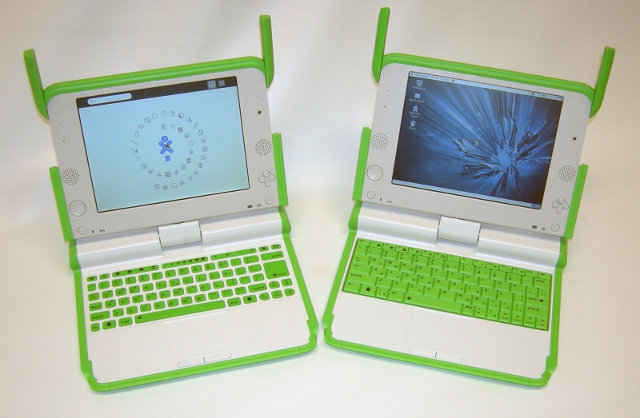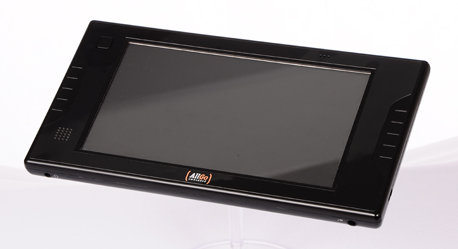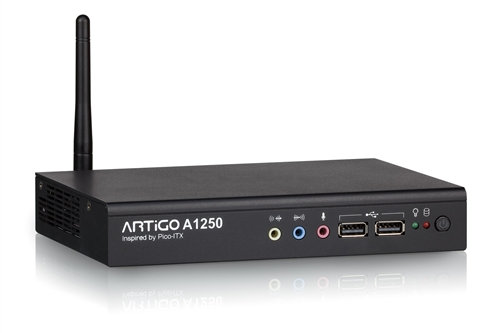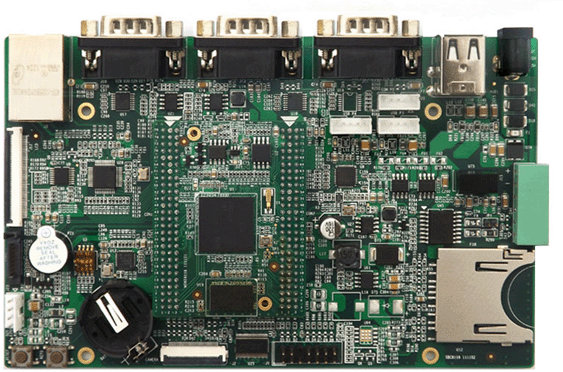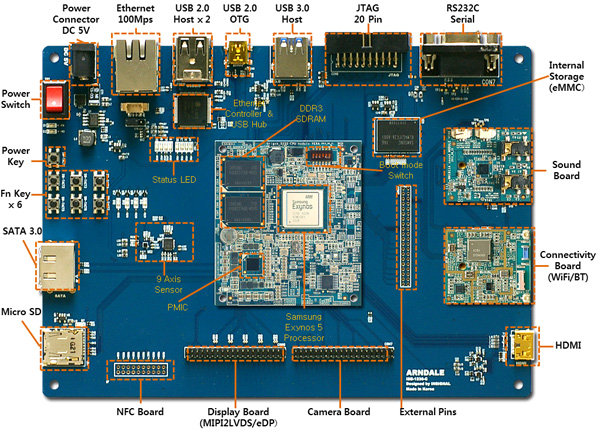Last year, OLPC (One Laptop Per Child) announced their first laptop powered by ARM, with OLPC X-1.75 powered by Marvell ARMADA 610 single core processor (And sold over 100,000 since Q1 2012). The 2 new models – OLPC XO-4 and OLPC XO-4 Touch – will be upgraded to ARMADA PXA2128 triple core processor (2 ARMv7 Core + 1 Hybrid LPM (Low Power Mode) ARMv7 core), which the OLPC XO-4 Touch offering multitouch support. OLPC XO-4 laptop will look exactly like the OLPC 1.75 laptop pictured below. OLPC XO-4 will have the following specifications: SoC – Marvell PXA2128 (ARMv7 compatible) @ 1 GHz with Vivante GC2000 GPU System memory – 1GB or 2GB DDR3 RAM (Depending on configuration) Mass storage: 4 GB or 8GB NAND flash (eMMC) Internal microSD card slot for repair/replacement Externally accessible SD card slot; Display – 7.5” dual-mode TFT display with touchscreen (2 simultaneous touch max) Audio […]
TI and AllGo Embedded Launch E-Tab Tablet Reference Design Powered by TI AM3354 Processor
Texas Instruments and Allgo Embedded jointly announced the availability of E-Tab, a tablet reference design based on Cortex A8 Sitara AM3354 processor that targets the healthcare, logistics, retail and education markets as well as hotels and restaurants. Here are the tablet reference designs specifications: Processor – TI’s AM3354 ARM Cortex-A8 microprocessor (up to 1 GHz) Operating System – Android ICS 4.0 System Memory – 512 MB DDR3 RAM Storage – 512 MB Nand Flash and 4GB Micro SD card Display – 7″ WVGA TFT LCD with 5-Touch Capacitive Touch panel Audio – Stereo Headphone, Internal MIC and Internal Mono Speaker Connectivity: WiFi 802.11 b/g/n + BT 2.1 Module Bluetooth 2.1 + EDR Ethernet 10/100Mbps (Optional) Camera – Internal USB Camera Module (Optional) USB Interfaces – USB High Speed Host Port and USB OTG (ADB and Debug purpose) Key/Button – Single Button for Back and Home screen, Reset Switch and Power […]
VIA ARTiGO A1250 Slim System Powered by Quad Core E-Series Processor
VIA Technologies announced the VIA ARTiGO A1250 slim system featuring a 1.0 GHz VIA QuadCore E-Series processor and VIA VX11H media system processor (MSP). The VIA ARTiGO A1250 is a low profile system targeted at home or office applications such as home server, home automation, hotel management, media streaming, digital signage, surveillance as well as medical and healthcare applications. Here are the key features of ARTIGO A1250: VIA QuadCore E-Series processor (U4650E) @ 1.0 GHz Up to 8GB of DDR3 1333 SDRAM SODIMM Supports one 2.5″ SATA HDD or Flash SSD installation Quiet, ultra slim profile design (3cm high) VIA VX11H media system processor with DirectX11 support 3D and HD video up to 1080p HDMI & VGA display ports with dual independent display support I/O: HDMI, VGA, 2x USB 3.0, 2x USB 2.0, GigaLAN, Audio-in/out/mic-in Average power consumption of 27W TDP Dimensions: 17.7cm x 12.5cm x 3.0cm I understand that inside […]
Embest SBC8118 Single Board Computer Based on TI AM1808 Processor
Embest recently unveiled the SBC8118 Single Board Computer, an industrial grade SBC powered by Texas Instruments AM1808 ARM9 processor with 128MB Mobile DDR2 RAM and 128MB NAND Flash. The SBC8118 Single Board Computer is aimed at medical, industrial automation, control, communication, and other cost sensitive applications. As you can see from the picture above, it is comprised of a CPU board and an expansion board. Here are the specifications of the CPU board (Mini8118): Processor – 375MHz TI AM1808 ARM926EJ-S Microcontroller (also supports 456MHz operation) Memory – 128 MByte Mobile DDR2 Storage – 128 MByte NAND Flash (on the rear of the board) & 8 Mbit SPI Flash Connectors – Two 2.0mm space 3*27-pin dip connectors and the expansion board: Audio/Video Interfaces: TFT LCD interface (50-pin FPC connector, RGB565) 4 line resistive Touch Screen interface Camera interface (30-pin FPC connector, supports CCD and CMOS cameras) Data Transfer Interfaces: Serial port: […]
The Yocto Project Release 1.3
The Yocto Project Release 1.3 has just been announced. This release codenamed “Danny” and based on Poky 8.0 is the fifth release of the project. The Yocto Project is a framework to assist developers in creating embedded Linux distributions. New features and updates for the Yocto Project 1.3 Improved terminal UI, which makes it easy to see the tasks that are currently executing, and avoids burying any warnings that are printed. Eliminated intermediate step when building cross compiler toolchain Relocatable SDK Large number of usability improvements in the Hob image building UI Upgraded eglibc to version 2.16 Upgraded gcc to version 4.7 Upgraded Linux kernel version to 3.4.11 Added yocto-bsp script for automating the initial parts of creating a new BSP Python functions now consistently use four spaces for indentation – no more having to try to match the mix of tabs and spaces in your recipes Disabled sharing shared […]
$249 Samsung Exynos 5 (Cortex A15) Arndale Development Board
Samsung has announced the first Cortex A15 development board available for purchase. Like the Origen board, Arndale development board has been designed by InSignal and features a dual core Exynos 5 (5250) cortex A15 processor @ 1.7 GHz, 2 GB RAM, internal storage via eMMC and plenty of ports. The development kit is composed of a CPU module (Exynos 5 , RAM and PMC) and a baseboard. Here are Arndale development board specifications: CPU Board Exynos 5 [email protected] GHz dual core 2GB 32-bit 800 MHz LPDDR3/LPDDR2 Base Board Sensors Accelerator : Invensence MPU-6050 Gyro : Invensence MPU-6050 e-Compass : AKM -AK8963C Camera Interfaces: ITU 601, MIPI CSI Video Ouput: HDMI 1.4 interface (micro HDMI) 1 channel eDP output Single WQXGA MIPI DSI interface USB: 1x USB3.0 Host 2x USB2.0 Host 1x USB 2.0 OTG SATA 1.0/2.0/3.0 interface 1 channel eMMC 4.5 1 channel SDIO 3.0 2 channel SD 2.0 (microSD slot) 4 channel […]
Linaro 12.10 Release with Linux kernel 3.6 and Android 4.1.2
Linaro release 12.10 has recently been announced, and includes Linux Kernel 3.6.1 and Android 4.1.2. This release provides further improvement to big.LITTLE architecture and Linux can boot on TC2 (A Test Chip with 2 Cortex A15 and 3 Cortex a7 cores) and an ARMv8 (Aarch64) OpenEmbedded community build is now available for download. Work has also be done on preparing demos for Linaro Connect (29 Oct – 02 Nov) in Copenhagen including a single ARM kernel booting on different boards. Here are the highlights of the release: Android Linaro Android 12.10 has been upgraded to 4.1.1_r6 and then to 4.1.2. Linaro Android builds are now shipped with improved instructions. AOSP Galaxy Nexus builds are available from http://android-build.linaro.org and include DS-5 support. Linaro Android toolchain has been updated to Linaro GCC 2012.10. Dalvik benchmarked against Hard-Float Open JDK and Java SE. Power meter improvements for LAVA automation. Prepared Connect demonstrations benchmarking […]
$132 Kingdel NC270 Thin Client Powered by Intel Atom N270
Reader onebir tipped me about a low cost Intel Atom based PC on Aliexpress with some decent specs. Kingdel NC270 PC is based on Intel Atom N270 processor @ 1.6 Ghz with 2 GB RAM and 8 GB SSD. It is capable of decoding 720p HD video and features lots of ports which could make it a good entry-level digital signage player among other things. Here are the specs of this nettop. Processor – Intel Atom n270 System Memory – 2 GB (in most places, but it’s also written 1GB in one place in the description) Storage – 8GB SSD (16GB and 320GB version is also available) Connectivity: 10/100 Ethernet WiFi (optional?) Serial Ports – female DB-25, compatible SPP, ECP and EPP | male DB-9, compatible FIFO prefix = st1 16C550 2 PS/2 port (mouse, keyboard) USB – 6 USB host 2.0 ports 1x PCI slot Video Output – VGA […]


